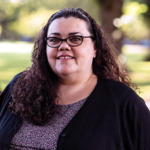Interviewer: Zoe Daugherty
Interview Date: February 28, 2024
Location: Interview conducted over Zoom
Duration: 1:28:43
In the interview, Dawn Marie Alapisco discusses her lengthy history with Oregon State University. She begins by diving into her past and illustrates how it defines her identity now. Specifically, she talks about being biracial, coming from two parents of different religions, and being on the autism spectrum, and how these experiences have made her feel as though she had no real sense of belonging. She turns this into a personalized melding of all aspects of her childhood into who she defines herself now.
From there, she talks about how she came to Oregon in 2008 originally to pursue a higher education within the nursing field but then fell in love with anthropology. This led her to the OSU Honors College, where she developed a thesis on the Odd Fellows Skeleton titled, “Skeletons in the Closet: A Historic Forensics Case from Scio, Oregon.”
Since the beginning of her time at Oregon State, Alapisco has also been heavily involved with NAGPRA (Native American Graves Protection and Repatriation Act) activities on campus, so when it came time to choose a NAGPRA coordinator there was only one clear choice as she had much experience as an indigenous woman with an archeology and human osteology background. In discussing this aspect of her life, she talks about her work and the challenges that she has faced as NAGPRA coordinator at OSU. She also delves into a topic about which she is extremely passionate: indigenizing academia.
Dublin Core
Title
Description
From there, she talks about how she came to Oregon in 2008 originally to pursue a higher education within the nursing field but then fell in love with anthropology. This led her to the OSU Honors College, where she developed a thesis on the Odd Fellows Skeleton titled, “Skeletons in the Closet: A Historic Forensics Case from Scio, Oregon.”
Since the beginning of her time at Oregon State, Alapisco has also been heavily involved with NAGPRA (Native American Graves Protection and Repatriation Act) activities on campus, so when it came time to choose a NAGPRA coordinator there was only one clear choice as she had much experience as an indigenous woman with an archeology and human osteology background. In discussing this aspect of her life, she talks about her work and the challenges that she has faced as NAGPRA coordinator at OSU. She also delves into a topic about which she is extremely passionate: indigenizing academia.

